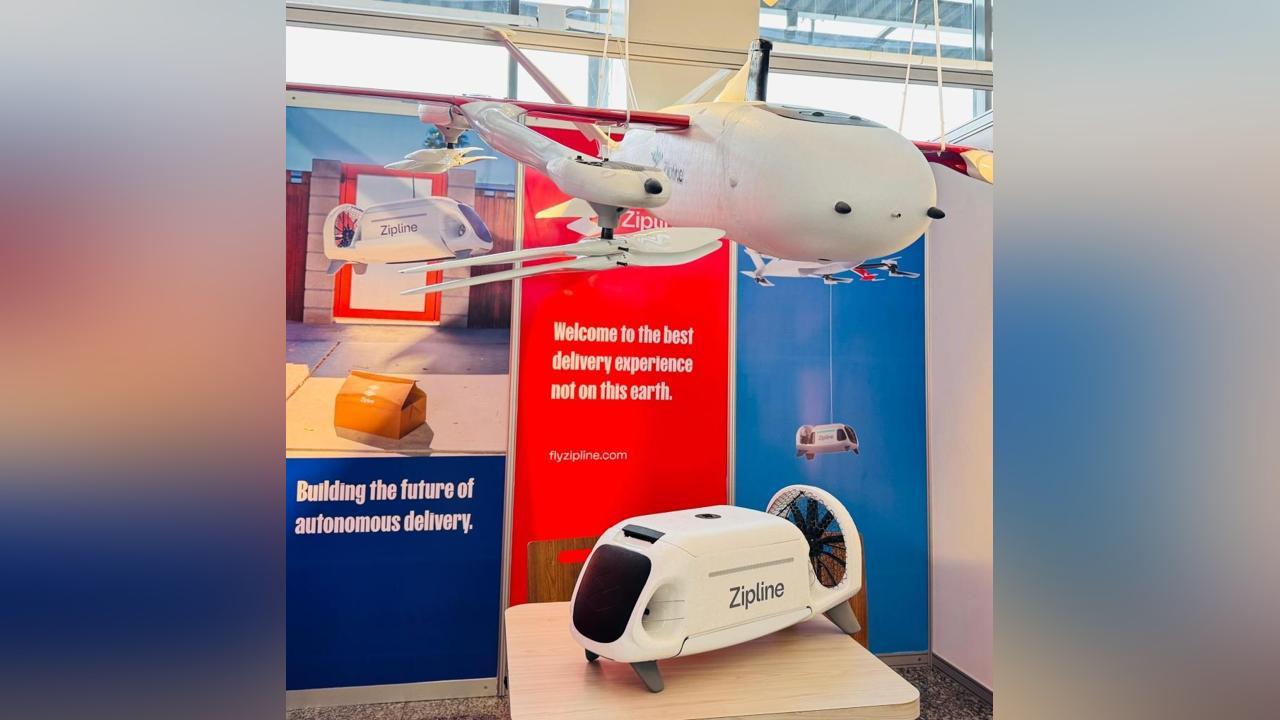Africa-Press – Rwanda. Starting next year, Rwandans in urban areas, especially in Kigali, could begin receiving their purchases – ranging from food and pharmacy items to e-commerce packages – delivered directly to their homes by drone within minutes.
At the Aviation Africa Summit 2025 held at the Kigali Convention Centre, Zipline unveiled its latest drone model it calls Platform 2 (P2) — a next-generation autonomous aircraft designed specifically for urban delivery.
“Hopefully, in 2026, we should be able to present something to the general public in Kigali where we can do home deliveries. So, we are really excited to complete the test phase and stabilising it as much as possible before we can launch and operate,” Pierre Kayitana, General Manager at Zipline Rwanda, told The New Times about the company’s roadmap for rolling out this new technology locally.
If all goes according to plan, Zipline aims to begin operating the new drone service in Kigali in 2026, supporting not just healthcare logistics, but also restaurants, supermarkets, and e-commerce platforms.
The drone was first launched in Dallas, Texas, in April 2025, where it is already being used for e-commerce and food deliveries. The company plans to finalise testing in the U.S. before officially launching in Rwanda, targeting 2026 for public rollout.
It has been in development for about 10 years, which he said reflects the developers’ commitment to delivering a high-quality product. The extended timeline allowed the developers to carefully balance efficiency and affordability in the design.
From rural health facilities to Kigali backyards
Zipline, known for pioneering drone delivery of medical supplies – including blood for emergency cases – from distribution centres in Muhanga and Kayonza, is now looking to expand its footprint into densely populated urban areas like the capital Kigali, and secondary cities such as Musanze, and Rubavu.
As of now, he said, each drone can carry up to 4 to 5 kilogrammes, roughly enough food for eight to 10 people—and cover a delivery radius of 20 to 25 kilometres on a single charge.
“The design will continue to improve so we can carry more weight in terms of payload and then can also afford to go to a longer range. So, that’s what our engineering team is working on,” he said.
Regarding drone speed, he said that it varies depending on wind conditions, with potential to reach up to 100 km per hour on a good day – when it is not windy.
He stated that the drones can reach any point across Kigali in about 15 minutes, given the capital its size.
Differences between the new drone and the existing models
Unlike the earlier drone model, which dropped packages via parachute, Kayitana said that the P2 drone is fitted with a device that contains the package, and wire or a sort of rope – under a precision winch-like delivery system – to safely lower the package to the ground. This makes it suitable for city environments with densely populated areas, high-rise buildings, and heavy traffic.
The P2 drone has several improvements over the earlier models, as described below:
Vertical takeoff: It can take off from anywhere and land on small spaces, without being launched from dedicated centres.
Two-way logistics: the drone can deliver and pick up packages, enabling reverse logistics such as sample collection for lab tests, unlike the current models that just drop packages.
Precision delivery: With advanced sensors, it gently lowers packages to the ground without risk to people or property.
“This model has taken 10 years to perfect,” Kayitana noted. “It’s more reliable, safer, and more flexible than anything we’ve built before.”
Clean and efficient – with prices expected to be reasonable
The P2 drone is fully electric, has zero carbon emissions, and is autonomous, making it an eco-friendly and cost-effective solution, Kayitana said, adding that its design is optimised to keep delivery costs low, though prices have not yet been determined for the local market.
“Once the aircraft is ready for commercial use in Kigali, we will discuss with different merchants, restaurants, shops, supermarkets, pharmacies, on a price that fits the budget of customers in Rwanda,” he said.
Regulatory preparations underway
Though Zipline is eager to launch, Kayitana said that legal and regulatory processes are still ongoing.
“We’re already in discussions with the relevant authorities to ensure the legal framework is in place,” he said. “Safety comes first.”
Meanwhile, speaking at the Aviation Africa Summit, President Paul Kagame commended Rwanda’s partnerships with Zipline, indicating that about a decade ago, they began working closely together to use drones for the delivery of urgent blood supplies to health facilities across the country.
This technology, he said, does not only save time; it also saves lives.
“Our cooperation has been very successful, and together we are exploring how to extend it to urban deliveries. This is the foundation of key industries of the future, like e-commerce,” he observed.
For More News And Analysis About Rwanda Follow Africa-Press






